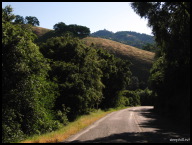I published this post over a decade ago. While I no longer can climb Mt. Hamilton in the Bay area, the arguments a small group of bikers had on their ride up the mountain continue to resonate among Americans.
“Why do people argue so much about education?”
I heard this question as I pumped up Mt. Hamilton. Biking up a California mountain forces you to think about many things or else you note how goofy you are for taking five hours to climb nineteen miles just to eat peanut butter sandwiches in the parking lot of the James Lick Observatory. So two friends and I chat about biking, the panoramas of the Santa Clara valley and, yes, even education.

About halfway up the mountain my friends and I began talking about the constant disagreement over schools. Victor mentioned the uproar over whether a high school should provide condoms to students. Deborah remembered a conversation with an aunt who was a “creationist.” They knew I was an educator and this led to Deborah’s question: “Why do people argue so much about education?” Let me pick up the conversation as we passed a sign that said five miles to the top.
“There’s a lot of agreement among Americans,” I said. “Most folks believe that kids have to learn the basic skills,” I paused for some breath. “They want kids to know the humanities, sciences, and arts. And most people believe that computers help kids learn more.”
Victor said: “OK, let’s say you’re right about the agreement but what about those controversial issues we just talked about? They show less consensus and more dissensus.” I liked how Victor could use those 50-cent words.
“Well, you’re right. Even with all of the agreement, there are serious differences among people about purposes of schooling.” I took a quick breath and said: “Many people want orderly schools where kids study academics, do well on tests, and get into college.”
Victor said that they had those schools when he grew up. I said: “Fine, but there are other people who want schools to help kids become independent thinking human beings who will use their minds and hearts to live full lives while working with others to build a better society.”
Victor turned and looked at my face to see if I was joking. “Do you have anything else in that water bottle? Those are beautiful sentiments but are there people who think schools can do that with kids?” Before I could answer, Deborah said to Victor: “I do.”
Deborah said she had gone to a middle school where teachers and students worked in teams on projects that included math, science, writing, and social studies. For one project the class worked with elderly poor people in a neighborhood facility. She read the newspaper to an old man who had no children. In school, they studied what the town and state did for the elderly and the problems they have. She marveled at how much she recalled from those experiences.
We stopped for a break two miles from the summit but the conversation continued. While I munched on carrot sticks, Deborah recalled class discussions about whether euthanasia was right or wrong. She wrote short stories and even had one published in the school newspaper; for the first time math made sense to her because teachers made sure that every project–including learning about the elderly-blended math with other content. What she remembered best, as we resumed our last pull to the top, were the teachers and friends she had made that year. She wanted her kids to go to that kind of school.
No one interrupted Deborah’s recollections. When she had finished, Victor said: “Deborah, your school was really different than mine but I’m not sure I would like my kids to go to that kind of school. It sounds too loose.” He continued, “I want a school that is a real school where they teach you what you have to know to get the right job or get you into college. It is nice to help out old people and have discussions but that’s not what schools are about.”
As Deborah started to protest, I said: “Hey, look, here we are finally reaching the top of the mountain on a beautiful day and we are arguing about which schools are good for kids. Don’t you see,” I said, “that there is no right answer here. There is no one best system of schooling. There is no one best way of teaching or learning.”
As I sat in front of the planetarium soaking up the sun, I continued. “That’s why parental choice keeps coming up over and over. That’s why many districts offer kids different programs. Both purposes are attractive to different people. Too few educators and public officials, however, lay out these differences in purposes and then try to seek the best of both.” And that,” I ended, “is why schools have been a battleground.” There was an awkward silence. As I got back on my bike I knew that this conversation was over. The discussion had gotten me up the mountain but it gave us no neat answers to a puzzling question. And on that swift, beautiful descent down Mt. Hamilton I thought about other things.


I recall an Education course I took at the University of Maryland where the class discussed this. I won’t pretend to recall exactly what we said, but what stands out in my memory after all these decades was HOW MUCH WE DISAGREED. Here we were, all prospective or beginning teachers, and we very much could NOT agree on the very goals of what we were all trying to do.
True then in your education courses as it is now. Thanks for comment.